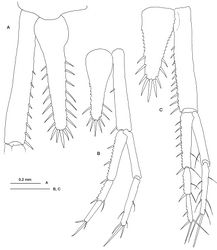Difference between revisions of "Mesolamprops denticulatus"
m (Imported from ZooKeys) |
m (1 revision) |
(No difference)
| |
Latest revision as of 15:09, 31 October 2012
| Notice: | This page is derived from the original publication listed below, whose author(s) should always be credited. Further contributors may edit and improve the content of this page and, consequently, need to be credited as well (see page history). Any assessment of factual correctness requires a careful review of the original article as well as of subsequent contributions.
If you are uncertain whether your planned contribution is correct or not, we suggest that you use the associated discussion page instead of editing the page directly. This page should be cited as follows (rationale):
Citation formats to copy and paste
BibTeX: @article{Corbera2012ZooKeys235, RIS/ Endnote: TY - JOUR Wikipedia/ Citizendium: <ref name="Corbera2012ZooKeys235">{{Citation See also the citation download page at the journal. |
Ordo: Cumacea
Familia: Lampropidae
Genus: Mesolamprops
Name
Mesolamprops denticulatus Ledoyer, 1983 – Wikispecies link – Pensoft Profile
- Mesolamprops denticulata – Ledoyer 1983[1], pp. 73–74, fig. 4; Ledoyer 1987[2], p. 68, fig. 5.
- Mesolamprops sp. A – Elizalde et al. 1993[3], p. 250.
- Mesolamprops denticulatus – Cartes et al. 2003[4], p. 749; Shalla and Bishop 2007[5], p. 1196.
Material examined
Cap Ferret Canyon, Bay of Biscay, ESSAIS I: stn TS01, 44°33.30'N, 2°08.30'W, 346–347 m, 21/04/89, 2 pread. female. ESSAIS II: stn TS04, 44°34.380'N, 2°10.18'W, 484–485 m, 18/05/89, 1 pread. female. ECOFER I: stn TS05, 44°35.57'N, 2°11.21'W, 522–523 m, 1/07/89, 2 pread. female, 1 pread. male, 1 adult male. J.-C. Sorbe leg.
Remarks
Mesolamprops denticulatus was described from the Mediterranean Sea by Ledoyer (1983)[1], who identified the main diagnostic characteristics of the adult male (the flagellum of antenna 2 extending only to the end of thorax and two pairs of pleopods). Ledoyer also noted the difficulty of distinguishing the females of this species from those of two nearby species, Hemilamprops normani Bonnier, 1896 and Hemilamprops cristatus (Sars, 1870). Nevertheless, a detailed comparative study of the telson and uropod structures has allowed us to establish the main differences. In Mesolamprops denticulatus the telson has only 3–4 pairs of lateral setae (Fig. 1A); it is shorter than in Hemilamprops, and the terminal setae scarcely reach the distal end of the uropod peduncle; the central terminal seta is longer than the remaining two. Moreover, during the same developmental stage, Mesolamprops denticulatus remains smaller than Hemilamprops normani,based on measurements takenin preadult females (carapace length: 1.13 vs 1.93 mm).
Distribution
Mesolamprops denticulatus was for a long time considered an endemic Mediterranean species until Shalla and Bishop (2007)[5] reported the presence of this species in the Faeroe-Shetland Channel. In addition, Elizalde et al. (1993)[3] recorded an undetermined Mesolamprops species from the Bay of Biscay, and recently a study of this same material confirmed that this specimens belongs to Mesolamprops denticulatus (Corbera and Sorbe in prep.). In the Mediterranean Sea, Mesolamprops denticulatus is distributed between depths of 170 and 570 m (Ledoyer 1983[1], 1987[2]; Cartes et al. 2003[4]), which is a bathymetric distribution pattern similar to that the observed in the Faeroe-Shetland Channel (259–753 m), as well as in the Bay of Biscay (346–708 m).
Taxon Treatment
- Corbera, J; 2012: Rare and new cumaceans (Crustacea, Peracarida) from the southern margin of the Cap Ferret Canyon (Bay of Biscay) ZooKeys, 235: 73-85. doi
Other References
- ↑ 1.0 1.1 1.2 Ledoyer M (1983) Contribution à l’étude de l’écologie de la faune vagile profonde de la Méditerranée nord-occidentale. II: Les cumacés (Crustacea). Tethys 11 (1): 67-81.
- ↑ 2.0 2.1 Ledoyer M (1987) Les Cumaces mediterranees profonds (Crustacea) des campagnes Biomedes I et II et Balgim. Synthese de la distribution bathyale du groupe en Mediterranee occidentale. Mesogee 47: 59-70.
- ↑ 3.0 3.1 Elizalde M, Sorbe J, Dauvin J (1993) Las comunidades suprabentónicas batiales del golfo de Vizcaya (margen sur del cañón de Cap-Ferret): composición faunística y estructura. Publicaciones Especiales del Instituto Español de Oceanografía 11: 247-258.
- ↑ 4.0 4.1 Cartes J, Jaume D, Madurell T (2003) Local changes in the composition and community structure of suprabenthic peracarid crustaceans on the bathyal Mediterranean: influence of environmental factors. Marine Biology 143 (4): 745-758. doi: 10.1007/s00227-003-1090-z
- ↑ 5.0 5.1 Shalla S, Bishop J (2007) Lampropidae (Crustacea: Cumacea) from the deep north-east Atlantic and the North Sea, with two new species of Hemilamprops and Mesolamprops. Journal of the Marine Biological Association of the United Kingdom 87 (5): 1191-1200. doi: 10.1017/S0025315407055063
Images
|
